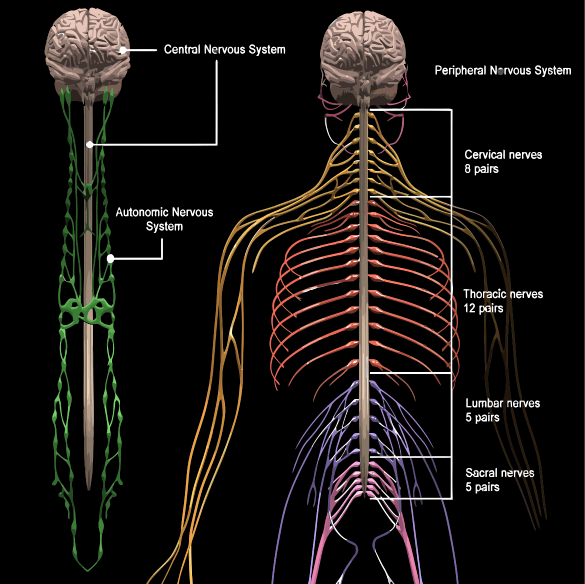Brain and Nervous System: It's Worth a Thought or Two
All our movement, thoughts, sensations, and bodily functions are controlled by the brain and nervous system, the most highly evolved among all living creatures and, sadly, the least understood. Neuroscientists are only beginning to unravel the myriad of mysteries of the human brain with many predicting we will never fully understand so many of the things we take for granted: memory, language, and creativity.
 Brain and Nervous System
Brain and Nervous SystemThe largest part of the brain is the cerebrum, which sets us apart from other animal species; not only is it the seat of intelligence and creativity, but it's also the source of such emotions as love, jealousy, forgiveness, anger, and others.
Taken as a whole, the nervous system is actually a complex branching network of systems with many overlapping parts and functions, all controlled by the brain and its spinal cord extension. Such automatic, or involuntary, functions as breathing, circulation, and digestion are directed largely by the autonomic nervous system, which is divided into the sympathetic and parasympathetic components. In simplified terms, these two systems act as switches to turn organs on and off, thus maintaining a state of balance.
In fact, keeping various systems in a state of balance, also known as homeostasis, is one of the most important functions of the brain. Imagine not feeling thirst and allowing yourself to dehydrate. Even as much as 2% water loss can have major implications. Or, how about not ever feeling satisfied during a meal. You would keep eating and eating. Breathing is another example. When you start to exercise your body senses the increase in carbon dioxide and as a result increases your breathing rate to keep the oxygen and carbon dioxide in balance. All of these functions are controlled by various receptor systems all controlled by the brain. And, it is all done automatically. You never have to think about feeling hungry, it just happens.
When it comes to movement and reaction to the environment, superficial sensory nerves receive messages from the outside world and transmit them to the brain, where they are interpreted and sent back through the body via the cranial or spinal nerves. All of this takes just a split second and often requires little or no thought. However, when something goes awry with the brain or other components of the nervous system, manifestations can be disastrous, ranging from trivial movement disorders to paralysis and dementia.
There are four major types of nerve cells:
- Central, which connect the spinal cord with the brain.
- Cranial, responsible for connecting the sense organs to the brain.
- Peripheral, that connect the spinal cord with your arms and legs. These are controlled voluntarily, except in the case of a reflex, such as when you touch a hot object.
- Autonomic, which connect the brain with the organs, such as the heart, vessels, kidneys, etc. These are totally automatically controlled. But in the case of breathing, you can exert some voluntary control for a limited time.
Facts Worth Thinking About
- A single nerve cell can reach several feet in length. The only cell in the body that can do this.
- Brain and nerve cells, once damaged beyond a certain point, or once dead, do not regenerate and do not get replaced by new ones. This is why brain damage is usually permanent.
- Nerve cells require electrolytes, such as sodium, magnesium, and potassium in order to work properly.
- Nerve cells work primarily with electrical impulses.
- Most of the brain's neurons have been established before the age of 5.
- The brain is made up of about 75% water and is 65% fatty tissue.
- There are about 100,000 miles of blood vessels in the human brain.
- More stimulation during childhood can lead to a 25% increase in future learning ability.
- The brain uses about 20% of your oxygen intake.
- Forgetting things is a normal process of the brain, which helps keep it flexible when it comes to learning new things.
- Lack of sleep hinders cognitive and memory abilities.



Leave a Reply